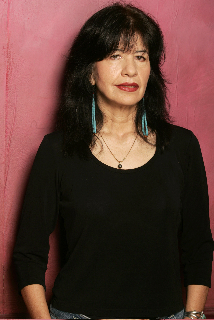
(Bald Eagle in Flight Denali National Park Alaska.)
Eagle Poem
by Joy Harjo
To pray you open your
whole self
To sky, to earth, to sun, to moon
To one whole voice that is you.
And know there is more
That you can’t see, can’t hear,
Can’t know except in moments
Steadily growing, and in languages
That aren’t always sound but other
Circles of motion.
Like eagle that Sunday morning
Over Salt River. Circled in blue sky
In wind, swept our hearts clean
With sacred wings.
We see you, see ourselves and know
That we must take the utmost care
And kindness in all things.
Breathe in, knowing we are made of
All this, and breathe, knowing
We are truly blessed because we
Were born, and die soon within a
True circle of motion,
Like eagle rounding out the morning
Inside us.
We pray that it will be done
In beauty.
In beauty.

Born May 9, 1951 in Tulsa, Oklahoma and an enrolled member of the Muscogee Tribe, Joy Harjo came to New Mexico to attend the Institute of American
Indian Arts where she studied painting and theatre, not music and
poetry, though she did write a few lyrics for an Indian acid rock band.
Joy attended the University of New Mexico where she received her B.A.
in 1976, followed by an M.F.A. from the University of Iowa. She has
also taken part in a non-degree program in Filmmaking from the
Anthropology Film Center.
She began writing poetry when the national Indian political
climate demanded singers and speakers, and was taken by the intensity
and beauty possible in the craft. Her most recent book of poetry is the
award-winning How We Became Human: New and Selected Poems. It
wasn't until she was in Denver that she took up the saxophone because
she wanted to learn how to sing and had in mind a band that would
combine the poetry with a music there were no words yet to define, a
music involving elements of tribal musics, jazz and rock. She
eventually returned to New Mexico where she began the first stirrings
of what was to be Joy Harjo and Poetic Justice when she began
working with Susan Williams. Their first meeting occurred several years
before in Blues Alley in Washington, D.C., a hint of things to come.
Joy has published in magazines such as Massachusetts Review,
Ploughshares, River Styx, Contact II, The Bloomsbury Review, Journal of
Ethnic Studies, American Voice, Sonora Review, Kenyon Review, Beloit
Poetry Review, Greenfield Review and Puerto del Sol. She has made recordings, done screenwriting, given readings all over the world and is now performing with her own music.
Joy has taught at Arizona State University as a Lecturer in
1980-81, at Santa Fe Community College as an Instructor in 1983-84, at
the Institute of American Indian Arts as an Instructor in 1978-79 and
in 1983-84. She was an Assistant Professor at the University of
Colorado from 1985-1988, an Associate Professor at the University of
Arizona in 1988-1990, a Full Professor at the University of New Mexico
from 1991-1995 and at the University of California at Los Angeles. She
is currently teaching at the University of New Mexico in Albuquerque.
Joy is a member of the PEN Advisory Board and the PEN New Mexico Advisory Board.
She has been a member of the Native American Public Broadcasting
Consortium Board of Directors from 1987 to 1990, The Phoenix Indian
Center Board of Directors in 1980-81, the Coordinating Council of
Literary Magazines Grants Panel for the Fall of 1980, the National
Endowment for the Arts Policy Panel for Literature 1980-83, the New
Mexico Arts Commission Advisory Panel 1979-80 and 1984, and the
National Third World Writers Association Board of Directors (which is
no longer functioning).
https://www.nativewiki.org/Joy_Harjo

https://web.ics.purdue.edu/~njp/Harjo.html
The Voices
from the Gaps website has a nice biographical sketch of Harjo, as does
the Internet Public Library's
Native
American Authors Project.
Joy is
featured at the American
Passages site from Annenberg/CPB under the heading "Poetry of Liberation,"
which also includes some useful activities (look for the "author questions" and "selected archives items" links)
for understanding Harjo's poetry.
To find out more about Poetic
Justice, the musical group Harjo performed with for several years,
visit the Silver Wave Records website. (If you have iTunes, go to Karen
Strom's page to find direct links to purchase
selected performances of Harjo's music and poetry.)
Watch and listen to Natalie
Gawdiak explain why Harjo's "Fishing" is an important poem to her at
the Favorite Poem Project website.
Harjo's poem "Remember" (from How We Became Human) has
a couple of interesting web versions: one is illustrated and has audio (music); the other is a hypertext with notes for key words and phrases.
In 1992, Joy Harjo participated in the Poetics
and Politics seminar at the University of Arizona; a video clip of
her reading as well as an interview and other materials are available on-line.
On April 17, 1998, Harjo did a reading at the DIA Center in New York
City; read Brighde
Mullins's introduction of her to hear one commentator's views of the
power of Harjo's poetry. You can also read J. Scott Bryson's scholarly
analysis of Harjo
as an ecological poetMELUS fall 2002) online.
If you're interested in learning about the Creek language, try the Creek
Language Archive. You can also learn about Muscogee
history on-line. The Muscogee
Nation of Oklahoma has an official website that you may find useful.
https://web.ics.purdue.edu/~njp/Harjo.html
**********************************
Joy Harjo posts reports here on her trips and other happenings.
https://www.joyharjo.com/news/


